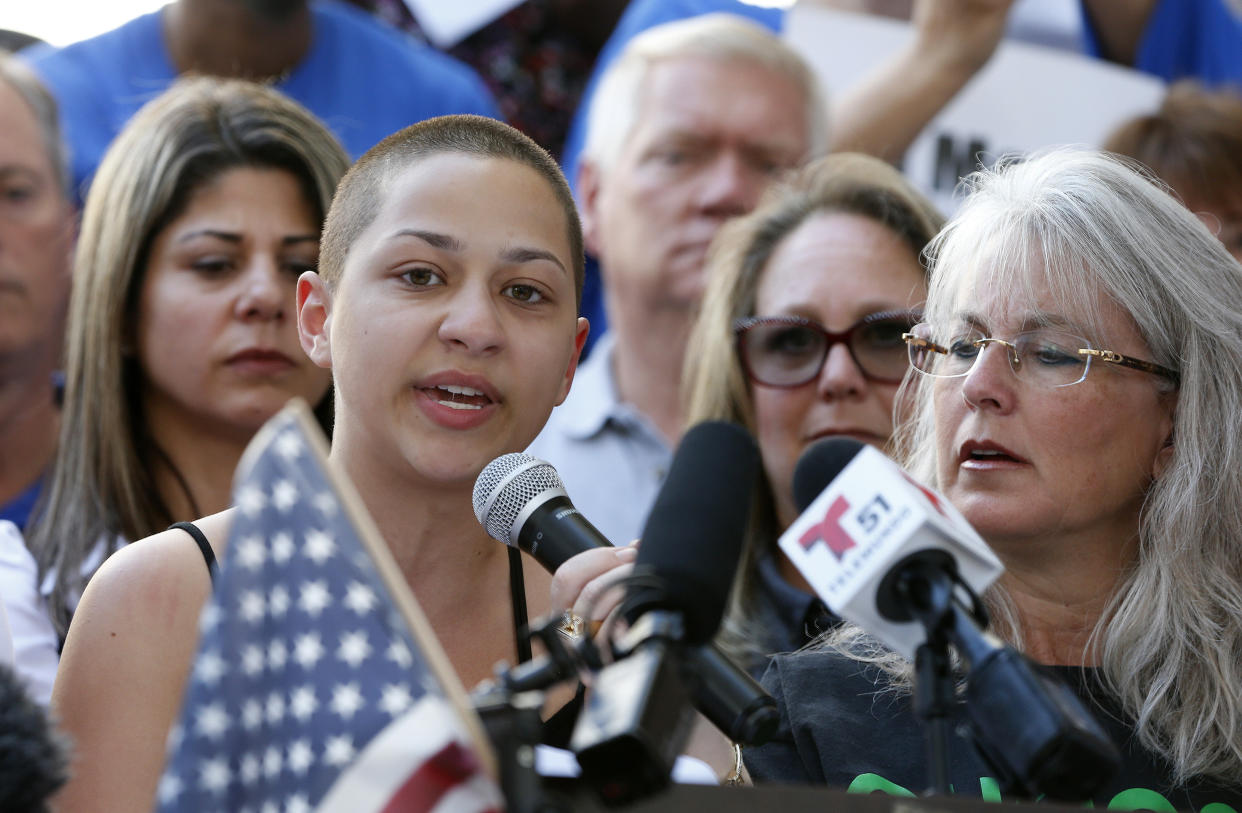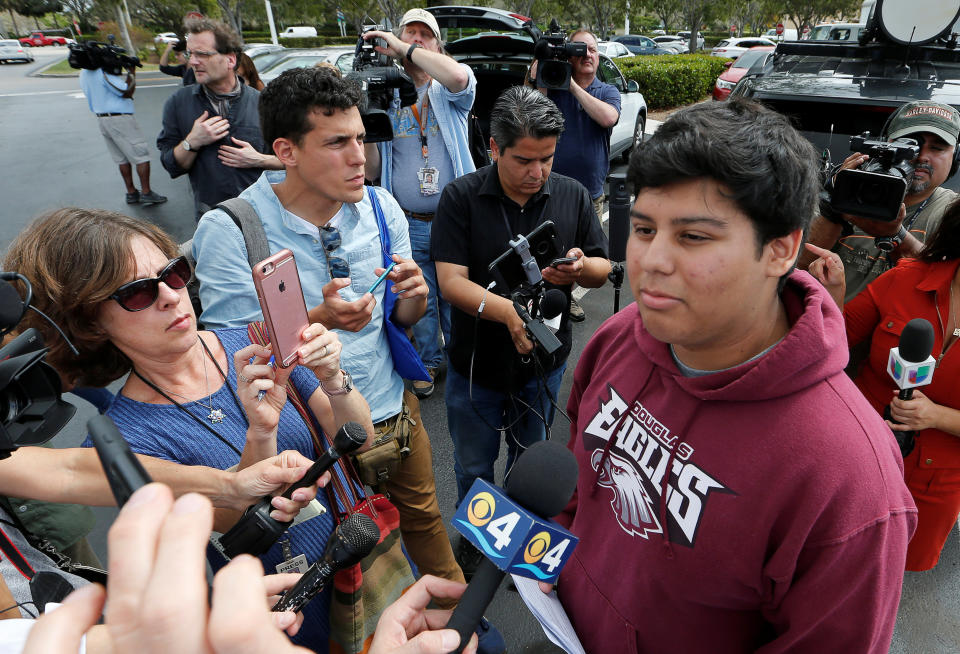Opinion: The Parkland Students Talk Straight To America

Five students who survived the recent mass shooting in Parkland, Florida, appeared on NBC’s “Meet the Press” on Sunday to discuss the social movement they are igniting around gun reform.
Jaclyn Corin, a junior at Marjory Stoneman Douglas High School, told host Chuck Todd, “We took 17 bullets to the heart. And we’re the only ones who can speak up. We have to be adults in this situation, because clearly people have failed us in the government. And we must make the change now because we’re the only ones that are going to.”
We expect school shootings, like the one at Marjory Stoneman Douglas High School on Valentine’s Day, to lead to renewed outcries for common-sense gun control. But what has been most striking about this particular tragedy and its aftermath is the collective role reversal in which the students, instead of the parents, are assuming the mantle of authority and leading the charge for change. As has been widely noted, these digital natives have skillfully used social media to build the case for their cause of gun reform, but equally instrumental has been the kind of speech they are using to articulate it.
Key to their success so far has been the way these students are coordinating their uses of “straight talk.”
The plain and outspoken speech we think of as straight talk has been a hallmark of English in America since its earliest days; Founding Fathers like Benjamin Franklin famously communicated in a clear and lucid style. Straight talk, however, was not recognized as a distinct speech genre in English until the late 19th century, around the same time psychologists were identifying adolescence as a separate stage of development and debating how to manage it.
For child psychologists like G. Stanley Hall, straight talk represented a language of moral authority, and they saw it as a tool for parents to reprimand their children. Hall documented the internal changes in adolescents and external conflicts they have with their parents ― what he called their “storm and stress.” He advised that parents of adolescents use straight talk when discussing sensitive and turbulent topics, addressing them “with candor and the requisite plainness.”
Sigmund Freud’s case studies in the early 20th century also include many instances of the doctor speaking bluntly and directly with his patients about taboo subjects, especially those linked to their adolescence. Straight talk was a way to protect adolescents from themselves by inspiring them to confront and control their instincts. Echoes of the paternalism that shaped straight talk’s early uses in the 20th century have remained with it ever since.

The student survivors at Stoneman Douglas, however, have been remarkably effective at turning the paternalistic prerogative of straight talk on its head, arguing it’s the adults who have abdicated their duty to keep them safe, while also capturing the power of plainspoken language to activate audiences and spark change. Many of the students speaking at rallies and on cable news shows have done so with the forceful directness and confident tones that we would normally associate with a parent or authority figure.
During a rally in Fort Lauderdale, Florida, on Saturday, Emma Gonzalez, a senior at Stoneman Douglas, captivated the country with the eloquent precision of her language that perfectly matched her unambiguous message that it was up to the students themselves to lead change on gun reform. In her words: “They say that no laws could have been able to prevent the hundreds of senseless tragedies that have occurred. We call BS! That us kids don’t know what we’re talking about, that we’re too young to understand how the government works. We call BS!” The crowd joined her in chanting the refrain “We call BS” throughout her impassioned speech.
David Hogg, a Stoneman Douglas senior who also appeared on “Meet the Press,” explained the moral stakes with impressive directness when he said, “Our community and our nation have taken too many bullets to the heart.” What is so powerful about Hogg’s words is the way he blends metaphoric and literal truth: Bullets, he suggests, make victims of us all.

Of course this is not the first time straight talk has been used as a powerful tool by activists, civil rights leaders and artists. Langston Hughes, the Harlem Renaissance poet and social activist, gave clear voice to protests against racial injustice and economic inequality in his 1936 poem “Let America Be America Again.” He writes: “I say it plain,/ America never was America to me,/ And yet I swear this oath –/ America will be!”
Some commentators have suggested the national attention these student protests are attracting is due to the affluence of their school district. While that has doubtless helped to give them a hearing, these students are maintaining the nation’s attention by invoking the language of parental authority to demonstrate how adults ― parents and politicians ― have failed to fulfill a crucial role: to protect children from gun violence.
The English poet William Wordsworth famously wrote, “The Child is father of the Man” to express the sway childhood holds over adult self-knowledge and the need for us to look backward to see our way forward. This line perfectly captures the role reversal that is happening at this moment as the young people of Parkland are claiming the same speech that G. Stanley Hall advocated for parents to use to protect children. Here the children are using it to save themselves from the inaction of adults.
The Parkland students speak with an authority beyond their years. Through their powerful public speeches, they have put into stark relief how much we need straight talk and resolute action instead of mere “thoughts and prayers.”
These young people are demanding, in their own clear terms, that we listen to and reckon with their urgent message of gun reform.
Matthew Krumholtz is head of philanthropic and strategic partnerships at HuffPost. He holds a Ph.D. in English from Princeton University, where his research focused on forms of dialogue invented in the 20th century and used by writers and filmmakers to ignite social movements.
ALSO ON HUFFPOST OPINION
Yes, We Can -- And Must -- Beat The NRA
The Real Threat To Campuses Isn't 'PC Culture.' It's Racism.
The Message Out Of Parkland That Should Terrify Republicans
Love HuffPost? Become a founding member of HuffPost Plus today.
This article originally appeared on HuffPost.

